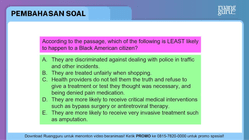Iklan
Pertanyaan
Questions 1-5 are based on the following passage!
African American have a dim view of the nation's health care system, which they see as infected by the same racism they encounter on the job, out shopping, in the classroom, or interacting with the police. A new nationwide poll by the Undefeated and the Kaiser Family Foundation (KFF), which is considered as the most comprehensive survey of Black attitudes and experiences with health care since the start of the pandemic found that 7 in 10 African Americans believe that people are treated unfairly based on race or ethnicity when they seek medical care. It's a feeling born of unequal history and intensified by the coronavirus pandemic, which is disproportionately ravaging Black lives both physically and economically.
The discrimination many African Americans endure, not only as they attempt to access health care, but also as they go about their daily lives. A majority of Black adults, 58 percent, said they had experienced discrimination in just the past year. One in 5 said they experienced it while seeking health care. One in 4 said they were discriminated against dealing with police in traffic and other incidents. Twenty-eight percent said they experienced racial bias on the job, while 40 per cent said they were treated unfairly while shopping. A large majority of Black Americans cited implicit bias as a major factor, both in preventing racial equality and as an obstacle in their own lives. At the same time, 7 in 10 Black respondents who said they were treated unfairly because of their race saw the discrimination as deliberate.
The survey which was taken as the country has been gripped by a monthslong racial reckoning prompted, in part, by the death of George Floyd in May under the knee of a Minneapolis police officer found scant trust among African Americans in fundamental American institutions. Only 1 in 4 trusted police to do the right thing for their communities all or most of the time. Less than half trusted local schools. Black Americans were more likely than white people to cite specific negative encounters with the health care system, including feeling that providers didn't believe they were telling the truth, being refused a treatment or test they thought was necessary, and being denied pain medication.
Researchers have documented many ways that Black patients are treated differently from white patients. In 2002, the Institute of Medicine's groundbreaking report, Unequal Treatment: Confronting Racial and Ethnic Disparities in Health Care, found higher rates of diseases, including diabetes, heart disease, hypertension and HIV, among Black and other people of colour. Yet, minority patients were less likely to receive critical medical interventions such as bypass surgery or antiretroviral therapy. At the same time, people of colour were more likely to receive extremely invasive treatments, such as amputations.
Different treatment contributed to mistrust, which only compounded medical problems, the report found. Minority patients are more likely to refuse recommended services, adhere poorly to treatment regimens and delay seeking care: it concluded. The report helped move the issue of racial disparities in health care into the mainstream of medical thinking. But rooting out the disparities, which are tightly bound to the nation's other social inequities, remains a problem.
(Adopted from https://www.nationalgeographic.com/history/2020/10/black-amerlcans-see-health-care-system-lnfected racism-new-poll-showsl
2. According to the passage, which of the following is LEAST likely to happen to a Black American citizen?
2. According to the passage, which of the following is LEAST likely to happen to a Black American citizen?
They are discriminated against dealing with police in traffic and other incidents.
They are treated unfairly when shopping.
Health providers do not tell them the truth and refuse to give a treatment or test they thought was necessary, and being denied pain medication.
They are more likely to receive critical medical interventions such as bypass surgery or antiretroviral therapy.
They are more likely to receive very invasive treatment such as amputation.
Iklan
N. Puspita
Master Teacher
1
5.0 (1 rating)
karina
tempat alasannya kurang paham tapi jawabannya benar
Iklan
Pertanyaan serupa
RUANGGURU HQ
Jl. Dr. Saharjo No.161, Manggarai Selatan, Tebet, Kota Jakarta Selatan, Daerah Khusus Ibukota Jakarta 12860
Produk Ruangguru
Bantuan & Panduan
Hubungi Kami
©2026 Ruangguru. All Rights Reserved PT. Ruang Raya Indonesia

















